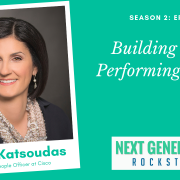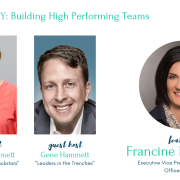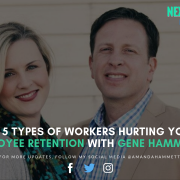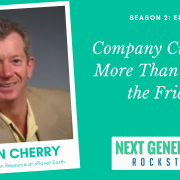DeeAnn Turner: Selecting Talent
Have you ever wondered why some companies can't seem to keep employees while other companies hire employees and then they stick around for years? According to Dee Ann Turner, former head of HR for Chick-Fil-A, it all comes down to selecting talent versus hiring people.
Dee Ann Turner is a Communicator, Consultant, and Coach. She began Dee Ann Turner, LLC after serving 33 years at Chick-fil-A, Inc. An early architect for Chick-fil-A's well-known culture and talent systems, she was Chick-fil-A's first female officer. Most recently, she was Vice President, Sustainability, launching and leading Chick-fil-A's first sustainability strategy. Selected as Chick-fil-A's first female officer, she previously served as the Vice President, Talent/Human Resources, a role she held for nearly 20 years.
Her first book, It’s My Pleasure: The Impact of Extraordinary Talent and a Compelling Culture, reveals the lessons she learned and taught during her long tenure at Chick-fil-A as the company grew from $175M to $10B in revenue.
More info about her: https://www.deeannturner.com/
Share the LOVE and TWEET about this episode.
Don't miss an episode. Subscribe to Next Generation Rockstars.
Disclaimer: This transcript was created using YouTube’s translator tool and that may mean that some of the words, grammar, and typos come from a misinterpretation of the video.
The Transcript - Selecting Talent
Welcome to the Next Generation Rockstars podcast. If you are trying to figure out how do you recruit and retain this next generation of rock star talent while you are in the right place.
Amanda Hammett: 00:14
Hey, good morning and welcome to the next generation rock stars podcast. I'm your host, Amanda Hammett, and we have a phenomenal leader for you today. Her name is Dee Ann Turner and Dee Ann used to be with the one and only Chick-Fil-A. Dee Ann, welcome to the show.
Dee Ann Turner: 00:31
Thank you so much. It's really my pleasure to be here, Amanda.
Amanda Hammett: 00:34
Wonderful. Like we have a lot to talk about because of Dee Ann well, I'll actually, why don't you go in and tell us a little bit about you.
Dee Ann Turner: 00:43
Sure. Well, it's quite a story. I did spend 33 years at chip full lie in the majority of that time. My responsibility was to lead talent and human resources and then later social responsibility. And I retired last year. I'd written my first book, it's my pleasure in 2015 and had the opportunity to just start speaking and robbing, consulting and coaching. And so I speak about 50 times a year globally. And I Baker publishing picked up, it's my pleasure and asked me to add content to it. Then we redid the work and it will come out on September the third Az bet on talent. How to create a remarkable culture and win the hearts of customers.
Amanda Hammett: 01:29
Perfect. Perfect. Well, you know, for those from my audience that is not familiar with Chick-Fil-A as a consumer, I will say this Chick-Fil-A is known not only for, you know, fast food, wonderful chicken, but they're known for their service. That is why for people like myself, that's why you go to Chick-Fil-A is because you know the service that's going to be good. You know, the food's going to be good, but it's the service that sets it apart. And I would imagine that you might've had a hand in that being over HR and talent for so long.
Dee Ann Turner: 02:04
I'd like to take credit for that. But there are actually a native so many people and number one is actually the Chick-Fil-A life franchisees themselves. See Chick-Fil-A is now, Oh, I guess about 2,500 franchisees and 10 and a half-billion dollars in sales. When I first went to Chick-Fil-A, I believe that we were at about 175 million in sales with 150 restaurants. But those franchises are totally responsible for selecting their own talent and training them and developing them. And so I think the secret sauce, if you will, of Chick-Fil-A is in the selection of that Franchisee. And that was one of the things I really did. In fact, it was my favorite job at Chick-Fil-A was selecting those franchisees. Now there are about 50,000 people who required each year for 120 opportunities to be a Chick-Fil-A grand chassis. So actually people say it's easier to get into Harvard than it is to become a Chick-Fil-A for the like franchisee.
Amanda Hammett: 03:07
Wow. I had no idea. I mean, I knew it was difficult. I actually know a few franchisees and that the process that they put you through is incredible. But I would like for you to say that stat again. What was that again?
Dee Ann Turner: 03:21
It's about 50,000 inquiries each year of people who would like to become a Chick-Fil-A like franchisees for only about 120 opportunities. And let me take it a little further. Two-thirds of the people who are selected actually come from somewhere within the organization. Most of them have been a Chick-Fil-A team member at some point. So now we're talking only about 35 or 40 that are even available to those apps.
Amanda Hammett: 03:50
That is insane. That is, those are some crazy numbers. So you, you actually just said a few minutes ago that this secret sauce to Chick-Fil-A was really the selection of those franchisees. So I, you know, that's something that we haven't really talked about on this show. Because usually, it's, it's specific to, you know, in house corporate, you know, hires, but this is a little different. So I mean, what makes it so different? What makes it so difficult, but what makes it so special?
Dee Ann Turner: 04:22
Well as I, you know, and of course this was my role a few years back, so I'm, you know, I want to be, I want to be sensitive to the fact that, you know, things maybe even a little different right now, but as it was when I had that role, um, you know, we look for three things when our candidates, and this really came from Truett Cathy, the founder, the first one is character. And he always said character first. And when we talk about character, we're talking about an individual whose values and purpose and mission-aligned with the organization. It doesn't, it doesn't mean it matches perfectly. It just means that they understand what those characteristics are and they're comfortable with that. So, along with the chick-fil-a purpose met mission and values would be one part of the Franchisee selection. And the second part is competency.
Dee Ann Turner: 05:10
And you know, the interesting thing that changed so much over the time I told you that we're not started doing that work. We had 175 million in sales and those were all mall restaurants. You see 86 Chick-Fil-A started opening free-standing locations will over time the volumes of those restaurants have become very complex. And by the way, about 500 of those phones, Chelsea's operating with two restaurants and a dozen or so operate three. So we're talking about, you know, very large, small businesses that these frames, same with these franchise needs or are running. So competency of what was required in 1985 to run a mall restaurant versus what's required in 2019 to run a freestanding restaurant with the kind of average sales that chick like produces. And then, and then to look at people and say, you know what, in a few years, we want them to have the capacity, the competency to actually operate more than one restaurant.
Dee Ann Turner: 06:08
So when we select for competency, it should flight, not just selecting a for what's available right then, but thinking is this the leader that has the capacity to do more later on? And then last week looking at chemistry, you know, how well does the chemistry matched the team, the franchisee market team that they're part of the people that they'll work with at the support center staff. So what we look for and what we look for at Chick-Fil-A is the number one character that matched the organization competency to match the role in chemistry that matches the team. And that's true of Franchisee selection at Chick-Fil-A. It's also true of the support staff.
Amanda Hammett: 06:52
Oh, absolutely. I am very good friends with several people that actually work at, at corporate headquarters and also the process to be hired there has, you know, it really is a long process, but it's also a very rigorous process and you guys have done an incredible job of leading through who's going to be successful. Because everybody I know that comes into work for check for like corporate, they're there for life there and they, they're very proud of that fact. And that's not something that you see a lot in other companies and other corporations in other industries. What do you think it is? what is it in that recruiting and hiring process that really makes you say, okay, this person is going to be a rock star here?
Dee Ann Turner: 07:43
Well, to start with, one of the things that I like to say is I don't hire people. I select talent. And there's a difference when you hire people, you, I think of quantity. Now think about in the restaurant environment, are there enough employees to cover the shift? Are there, you know, do I have enough people in the dining room to have enough people in the back of the house to prepare food? But when I think about selecting talent, it's like do I have the people with the character, competence, and chemistry to fit the organizations the role and the team. And so that first difference is a huge difference. The difference between hiring people and selecting Tamar. And I think the other part, um, and over time, especially with the millennial generation, you know, they want faster decisions and faster opportunities. So cheerful life might adjustment overtime in their selection culture around that.
Dee Ann Turner: 08:33
You know, when I came on board, it wasn't uncommon to take six months to be selected. And now that time has had to shorten. But one of the things that, that chick-fil-a doesn't cut corners on is making sure that it's a match both ways. Making sure that the candidate is not just the best candidate for the job, but that the candidate sees chick-fil-a is the best organization. Yeah. So the selection process includes opportunities not just to evaluate the candidate, but most clearly for the candidate to also evaluate Chick-Fil-A. And while, you know, you made the comment, you said they're there for life and you know, I was there for 33 years, there are 40-year veterans. It's a common thing, but the reality is is that business is changing and generational differences in. So now, you know, as I was particularly, we would say, we'd like longterm decisions.
Dee Ann Turner: 09:24
So we hope that people will be with us longer than what you would expect somebody to be with an organization. But we recognized that things were changing and not necessarily was that a lifetime anymore, but it very well could be. The reason is after the selection of that talent, they just, the way Chick-Fil-A stewards their talent and the opportunities that they have. And you know, every person at the support center, positive development plan, everybody has a budget for their own personal development and then work with their supervisor and in their self-identified needs and like can use those development dollars in all kinds of ways to improve not just as an employee and a leader, but also I'm personally in areas that would help them personally to better develop, to be more effective in their role. And chick-fil-a and franchisees helped the same opportunity is part of their agreement is they're able to use funds for their own development too. So it's an organization that truly believes in lifelong learning, provides those opportunities to steward their talent well. And that has a lot to do. One stay so long.
Amanda Hammett: 10:35
Oh, I would agree. I, as you know, as my friends have always said, you know, that is one of the things that they have enjoyed the most is that they have been encouraged to continue to learn. There's a lot of companies out there that say, Oh yeah, yeah we will, we provide these opportunities. But actually, it is really something that is important. It's in the day to day culture and it's very much encouraged to for everyone to do that. And that is something that is so important, especially for millennials, especially for Gen z employees. They're looking for that investment in them and they're looking to be able to continuously learn and grow and push themselves in different ways. So I love this. You guys are way ahead of the curve. This is wonderful.
Dee Ann Turner: 11:21
Alright. You know, as I said, it's growing constantly and chicken lady continues to add a lot of talent in this area of their business and I'm sure that that will help secure that for the future as well. And you know, part of my work in the last year since retired particularly is traveling around to a lot of other organizations too and seeing some of their remarkable cultures and I continue to find that organizations that are willing to invest, you know, a lot in their selection process and then also in the stewardship that those employees are able to keep them around a lot longer. You know, one of the things that were kind of funny, I'll have to tell you, when I first came to Chick-Fil-A and I started this work, I didn't have a budget for real key item in human resources.
Dee Ann Turner: 12:07
I didn't have a budget for separation. It's amazing. And the reason I did is that the truth, Kathy really getting intend on making any changes. I had a very nice budget for selection and I had a pretty healthy budget for stewardship, but it had no budget for separation because he didn't really believe he believed if we did those other two things, well we really wouldn't have that money. Now, of course, is Chick-Fil-A grew from a, like I said, $175 million when I came there, the 10 and a half billion when I left, we obviously needed that. But to that very day that the selection and stewardship project always outweighed what we, what was invested separation.
Amanda Hammett: 12:51
So let's talk about that all talents. And that is coming out when?
Dee Ann Turner: 12:54
September 3rd.
Amanda Hammett: 12:56
September the third. So for those of you watching or listening is already available to be pre-ordered pretty much everywhere. Correct?
Dee Ann Turner: 13:06
Here, go to my website and get it too.
Amanda Hammett: 13:09
Okay. All right, we'll put a link to that below this interview, but so why was bet on talent so important for you to write? Because writing a book is not easy. It is sometimes a very painful process, but why was it so important for you to write that on top?
Dee Ann Turner: 13:26
You know, the funny thing is is that I wanted to be a writer since I was eight years old. I was a journalism major. My first trip to college and when I got out of school when I realized was two things. One is I didn't have the life experience and anybody was going to read more, read about everything after a drive. And secondly, I could live again. So I took off in a little bit of a different direction, but that love never left me.
Dee Ann Turner: 13:49
And finally in 2014 when two things have happened, the year before my dad had passed away. And in 2014, Truett Cathy passed away and they had really been two significant business mentors in my life. And all of a sudden I started writing down all of these lessons, all of these things that I had learned and principles around growing remarkable culturing around selecting extraordinary talents on started his blog posts. And the next thing I knew I had 16,000 words. I was on my way to a book. And so it came important to me to publish the book for two reasons. One is I didn't want the things that I had learned I didn't want the people that were on that journey with me is on the earth. Those early days of Chick-Fil-A lady learn directly from true it. I didn't want us to ever forget what he taught us. And secondly, all the thousands of people that would come after me, I wanted there to be some record of what we learned because, you know, true, it said people decisions from the most important decisions a leader makes. And Ben on talent is really, the encapsulation of how you make those great people decisions. And I just felt like it was something very, very important that lots of people would benefit from. And so that's why I've written it.
Amanda Hammett: 15:06
That's amazing. Cool. I love, I love that because I think that a lot of times companies can be a little shortsighted when it comes to recruiting. Now I'm a former recruiter, so I understand that what I'm about to say is probably not very popular. But a lot of times it's more about filling a role, filling a role, and they're only looking at that immediate need. And I liked that you guys are Chick-Fil-A specifically focused on the person as in a very holistic way. And not only just the person and what they're capable of then, but where they can go eventually as long as everything, values, and character align that can take you really far, but it's not, but it's gotta be something that you've got to have the vision for. Now let me ask you this. What have you guys found or what have you seen, whether it's a Chick-Fil-A or some of the other companies that you've been working with since you're retired, since your retirement? Have you noticed any financial benefit to really focusing on talent and getting the right talent the first time?
Dee Ann Turner: 16:18
Well, there's not a question about when you talk with other organizations about this too, but that the when you focus on selecting the right talent from the beginning, I mean just the cost savings of what it takes to resect and retraining and so forth with people. So even though it's painful, especially in this full-employment economy, we're all in. I mean, that's everywhere I go to, that's what we're talking about is this cool employment economy. And you know, I'm just, I'm lucky to get a warm body much less, you're talking about this extensive selection process, but in the recruiting process, you know what I encourage employers and companies always be recruiting talent is around you all the time. Don't wait too. You have a role to be recruiting. Recruiting is about relationships and developing those relationships so that when you have that opportunity, it's right there.
Dee Ann Turner: 17:15
You've got that person there, you've built that relationship and they're ready because they have a personal relationship with you. They're willing to make that change. Even in economy, in full employment economy that we're in now. Now think about an executive on work with three years. He was five when I, my role was heavy recruiting. Amanda, what? I loved this executive because a lot of other executives is like, that was my job. You know, go find the people. That's your job. And but he was different. He saw that it was a partnership and that was very much a part of his to always be recruiting. And that guy never had a problem finding talent. In fact, to this day, some of the really outstanding young leaders, I'll see a Chick-Fil-A as this executive selected them and here they are growing and so forth. But it started in relationships, some of them when they were still in high school. And I saw the same thing. I was with a client recently in speaking at their conference and I was watching some of their success stories and you know, they had one of their leaders was very involved in the community and she spent a lot of time developing those relationships and all of her counterparts were talking about how they couldn't find any talent. She has people waiting in line waiting for an opening in her organization.
Amanda Hammett: 18:35
That's an amazing thing to see. But it's, it's also very amazing to me that people want to complain, but they don't want to put in the work to build those relationships, which are so valuable.
Dee Ann Turner: 18:49
Well, wait here that, I mean, you know, when you have a job, you know, you think about all the other roles that people, that leaders have. I mean, and they have this main thing they're being held accountable for in the organization, which is why it's so important that as organizations select leaders, they select people who can be talent, mammals who can attract people who are great. They're not great managers, they're great leaders that people will want to follow. Because they do have other responsibilities. But this is key for their success in those who do it well, know that they know the better talent they select, the easier their job will be. And actually, when they have great talent, they can spend more time on finding work tower.
Amanda Hammett: 19:32
That's true. So let me ask you this, you kind of talked about the new kind of, you know, talked about this just a second ago, but let's say we have a team, young team, millennials, Gen C's, and how do you recognize when you're looking at this team, who has the capability of being a great leader? Is there something that you're looking for when you look out at this group?
Dee Ann Turner: 19:59
Cool. For me, I'm looking for a track record and you know, a strong track record of leadership. Even in the youngest of candidates. I started, I'll tell you a story about this young man. I'm super proud of him. I started recruiting him when he was in the 10th grade to be a Chick-Fil-A support center staff member. Now he was years away from being eligible, but he was well-rounded. He was, I can I sign on the football field. He was the leader, he was a great student. He had ambition and dreams. And so he happened to be a friend of one of my sons and I just developed a relationship with them. Impala. His first year out of Georgia tech when it was a time when jobs were a little bit more scares. But you know, most organizations want freshman interns in there.
Dee Ann Turner: 20:49
They're high, they're selecting, excuse me, junior year. Well, some of them are adding, but we would be selecting juniors and seniors, you know, that could come on board with us afterward. But I was able to convince the group that he would work with that he was just a really exceptional talent. And so he came on board and he worked that summer and did a fabulous job. Went Back to Georgia Tech and the next two summers he spent at ups and Halliburton and we competed to get him that final summer. And he came and he's still there today. He's been there for a number of years now. I want to say maybe he's, I can't say six or seven, but leading in his function, doing a great job, bright future. And you know, that's, that's not uncommon about how to look at talent. It's like, so, you know, he had that leadership track record, that strong character, even for the few responsibilities he had, even as a teenager, he shoulda a lot of competencies there in his relationship strength, the chemistry with other people.
Dee Ann Turner: 21:52
It was really obvious. So if you know what you're looking for in your talent that you're looking for that character competency and chemistry and what the traits are in that, then it's, that is a whole lot easier to identify it. So the first thing you asked me the question, what are you looking for? Well, the first thing I'm looking, I'm looking for is a leadership track record because I know that these people decisions that eventually, even if it's not a leadership role, right then I'm going to need leaders and great source of getting leaders would be from the bitch that I've already created. So I'm trying to bring those walls. The second thing I'm looking for, I'm looking at there for people who are here to serve. Now, I've spent my career in the hospitality and service industry. So obviously that would be part of what I would be looking for is people who are wanting to serve others.
Dee Ann Turner: 22:38
ou never want my sweat to a corporate staff member. Their whole job was to serve chick-fil-a franchisees. Our franchisee's job is pretty obvious. They're serving customers and even their own employees. So I'm looking for people who have a real heart for service was always important to me. I look for people who were showing good judgment and good decision making. You know, we all make mistakes. I've made my full share of course, but when you see a pattern of that is probably not the best talent you could select. So I'm looking for somebody who's made a strong track record of good decisions. Those are some very general things above and beyond what's required for the job. But that's the when I'm looking for the diamond in the rough, so mine doesn't have a lot of experience. Those are the types of things I'm looking for.
Amanda Hammett: 23:28
That's amazing. I love that. And I love that you have this completely laid out. This is your very specific that is I think a skill that a lot of hiring managers at whatever level you may be a need to really develop. Is this being able to say, okay, it's more than just what's on a resume? It's like, it's got to be more than that. I am not a believer in the warm body recruiting process is what I call it. I'm more in they've got to fit your culture and it sounds like you've got that down pat. I love that too.
Dee Ann Turner: 24:03
Warm bodies are just hiring people, but when you find a match that's working talent.
Amanda Hammett: 24:08
Absolutely. Absolutely. Well wonderful. Well, Dan, I have enjoyed this time with you so, so much. We could actually go on for another two or three hours, but I try to be very mindful of my audience members time and effort. Where can you tell everybody where they can find your book? Remind them again when it's going to come out and yeah, let's do that.
Dee Ann Turner: 24:34
Right. Bet on talent. How to create your remarkable culture that wins the hearts of customers will be released on September 3rd is now available for preorder just about anywhere anyone would order books online and it'll be in bookstores on September the third I'll say, visit me at my website, which is at DeeAnn, excuse me, DeeAnnTurner.com. You can order the book directly from retailers off of that one. Also, I might ask your listeners to please follow me, especially on a at Linkedin, at @DeenAnnTurner, on Twitter, at Instagram at the Internet and then finally my Facebook author page. I would love to interact with them there.
Amanda Hammett: 25:16
Perfect. Well, wonderful. Well, thank you guys so much for joining us. I hope that you took a tremendous amount of notes and learned a lot from Dee Ann and we will see you in the very next episode.
Amanda Hammett: 25:28
Thanks so much for joining us for this episode of the Next Generation Rockstars where we have discussed all recruiting and retaining that next generation of talent. So I'm guessing that you probably learned a tremendous amount from this week's rock star leader and if that is the case, don't keep me a secret, share this episode with the world, but really share it with your friends, with your colleagues because they also need to learn how to recruit and retain this next generation of talent because these skills are crucial to business success moving forward. Now, of course, I want you to keep up to date every single week as we are dropping each and every episode. So be sure to subscribe to your favorite podcast platform of your choice, and you will see the Next Generation Rockstars show up just for you.
Disclaimer: This transcript was created using YouTube’s translator tool and that may mean that some of the words, grammar, and typos come from a misinterpretation of the video.
Podcast: Play in new window | Download













